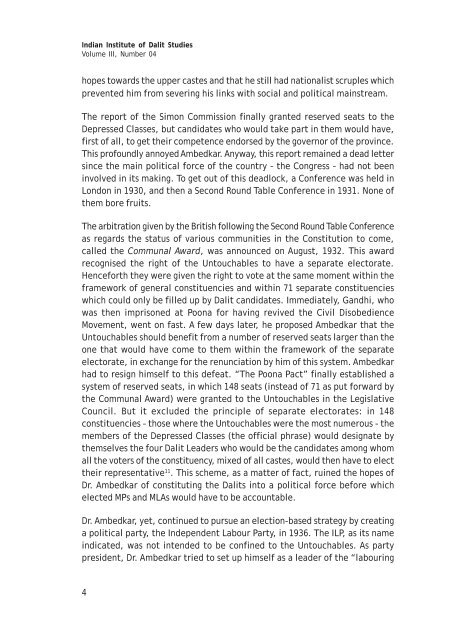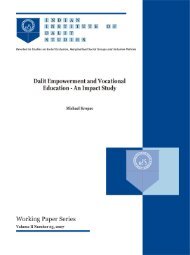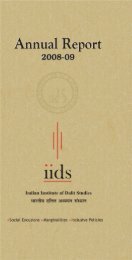Dr. Ambedkar's Strategies Against Untouchability and the Caste
Dr. Ambedkar's Strategies Against Untouchability and the Caste
Dr. Ambedkar's Strategies Against Untouchability and the Caste
Create successful ePaper yourself
Turn your PDF publications into a flip-book with our unique Google optimized e-Paper software.
Indian Institute of Dalit Studies<br />
Volume III, Number 04<br />
hopes towards <strong>the</strong> upper castes <strong>and</strong> that he still had nationalist scruples which<br />
prevented him from severing his links with social <strong>and</strong> political mainstream.<br />
The report of <strong>the</strong> Simon Commission finally granted reserved seats to <strong>the</strong><br />
Depressed Classes, but c<strong>and</strong>idates who would take part in <strong>the</strong>m would have,<br />
first of all, to get <strong>the</strong>ir competence endorsed by <strong>the</strong> governor of <strong>the</strong> province.<br />
This profoundly annoyed Ambedkar. Anyway, this report remained a dead letter<br />
since <strong>the</strong> main political force of <strong>the</strong> country – <strong>the</strong> Congress – had not been<br />
involved in its making. To get out of this deadlock, a Conference was held in<br />
London in 1930, <strong>and</strong> <strong>the</strong>n a Second Round Table Conference in 1931. None of<br />
<strong>the</strong>m bore fruits.<br />
The arbitration given by <strong>the</strong> British following <strong>the</strong> Second Round Table Conference<br />
as regards <strong>the</strong> status of various communities in <strong>the</strong> Constitution to come,<br />
called <strong>the</strong> Communal Award, was announced on August, 1932. This award<br />
recognised <strong>the</strong> right of <strong>the</strong> Untouchables to have a separate electorate.<br />
Henceforth <strong>the</strong>y were given <strong>the</strong> right to vote at <strong>the</strong> same moment within <strong>the</strong><br />
framework of general constituencies <strong>and</strong> within 71 separate constituencies<br />
which could only be filled up by Dalit c<strong>and</strong>idates. Immediately, G<strong>and</strong>hi, who<br />
was <strong>the</strong>n imprisoned at Poona for having revived <strong>the</strong> Civil Disobedience<br />
Movement, went on fast. A few days later, he proposed Ambedkar that <strong>the</strong><br />
Untouchables should benefit from a number of reserved seats larger than <strong>the</strong><br />
one that would have come to <strong>the</strong>m within <strong>the</strong> framework of <strong>the</strong> separate<br />
electorate, in exchange for <strong>the</strong> renunciation by him of this system. Ambedkar<br />
had to resign himself to this defeat. “The Poona Pact” finally established a<br />
system of reserved seats, in which 148 seats (instead of 71 as put forward by<br />
<strong>the</strong> Communal Award) were granted to <strong>the</strong> Untouchables in <strong>the</strong> Legislative<br />
Council. But it excluded <strong>the</strong> principle of separate electorates: in 148<br />
constituencies – those where <strong>the</strong> Untouchables were <strong>the</strong> most numerous - <strong>the</strong><br />
members of <strong>the</strong> Depressed Classes (<strong>the</strong> official phrase) would designate by<br />
<strong>the</strong>mselves <strong>the</strong> four Dalit Leaders who would be <strong>the</strong> c<strong>and</strong>idates among whom<br />
all <strong>the</strong> voters of <strong>the</strong> constituency, mixed of all castes, would <strong>the</strong>n have to elect<br />
<strong>the</strong>ir representative 11 . This scheme, as a matter of fact, ruined <strong>the</strong> hopes of<br />
<strong>Dr</strong>. Ambedkar of constituting <strong>the</strong> Dalits into a political force before which<br />
elected MPs <strong>and</strong> MLAs would have to be accountable.<br />
<strong>Dr</strong>. Ambedkar, yet, continued to pursue an election-based strategy by creating<br />
a political party, <strong>the</strong> Independent Labour Party, in 1936. The ILP, as its name<br />
indicated, was not intended to be confined to <strong>the</strong> Untouchables. As party<br />
president, <strong>Dr</strong>. Ambedkar tried to set up himself as a leader of <strong>the</strong> “labouring<br />
4





